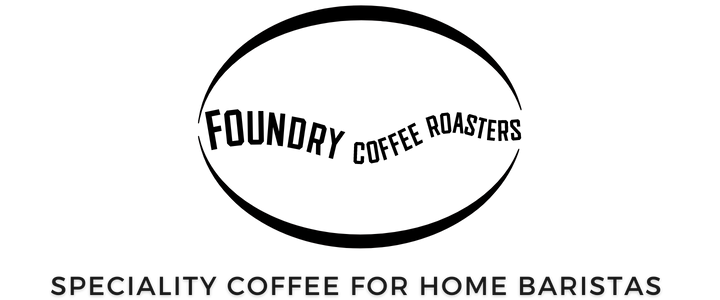-
Buy Coffee
-
Buy Other Stuff
-
Everything Else
ORDERS PLACED NOW WILL BE SHIPPED ON MONDAY 29th DECEMBER - (more info here)
September 16, 2022
When we first started roasting coffee, back in 2012, speciality coffee shops were easier to spot. They looked different to other coffee shops.
Enterprising, independent businesses back then would make the most of what they had, because fitting out a shop is expensive. Concrete, bare plaster, mismatched tables - you know the look. For a lot of these shops, it was more important to spend the little money they had on the equipment that was needed to make great coffee.
Since then, we've seen this aesthetic adopted by so many shops that it's become standard. It's now a way to signal to your potential customers what you are about. Less borne out of necessity and more about conveying your speciality credentials.
There's now a template which anyone can adopt. It's easy to say you're a speciality coffee shop and who is to say you're not?
What makes a speciality coffee shop special?
It's about whether the shop is able to make decisions about the coffee that it serves. It's about independence. Those coffee lovers out there that don't work within our industry are often surprised to hear that few coffee shops are truly independent.
Why is this? - there are a few things going on.
A wholesale model that is broken.
The way most coffee shops get their coffee hasn't changed in decades. They will have their coffee supplied on a contracted basis by a coffee roaster. The roaster may provide them with 'free' equipment, and in return, the shop agrees to buy their coffee from them.
As the speciality coffee market has grown, we have seen what appears to be a 'race to the bottom' as far as this wholesale model goes. Prices have been heading downwards for years as roasters scramble to secure accounts, undercutting each other as they go. As roasting businesses become increasingly desperate for market share, quality suffers.
I'd recommend you watch this excellent video from Maxwell Colonna-Dashwood, he does a great job of illuminating this particular issue.
There is no such thing as free equipment. The roaster has to pay for it, and the cost is built into the price that the coffee shop pays for every kilo of coffee. The problem is that the market is so competitive that by the time the roaster has paid for the 'free' equipment, and accounted for making a profit, there is precious little left for the thing that is supposed to matter the most, the coffee.
As a result, we see the trend continuing for 'house espresso', the near ubiquitous espresso blends. Blends are comprised of cheap, low quality coffee, blended to produce espresso that is generic, at best. Not a surprising outcome when low prices are the most important thing. If you want to know about why blends suck, you could read this.
It's depressing to think that a coffee shop spending £10,000 (often a lot more) per year on coffee has to make their espresso based drinks (which make up the vast majority of what they sell) with sub-standard coffee.
Defining speciality coffee.
Another issue is the ease with which a roaster can sell 'speciality coffee'. Technically, any coffee with a score above 80 on the Q scale (you can find out more about all that here) can be referred to as speciality coffee.
Every quality-focussed roaster knows that this threshold should be set much higher. As things stand, a roaster can take three 80 scoring coffees and produce something that they can legitimately call a 'speciality' blend. Trust me, it's not going to taste good.
How do we fix all this?
The simplest thing we could do (and least likely to happen anytime soon) is to raise the bar for speciality coffee. In our experience, the threshold should be set at 85 or 86 on the Q scale. An 85+ scoring coffee is on a different level to one scoring 80. There is no comparison, it's night and day. There will always be a place for low scoring coffee - but it shouldn't be in the speciality coffee industry.
Any coffee shop spending five figures on coffee in a single year can afford to buy, or at least lease a grinder. They'll then be free to break free from restrictive contracts and buy coffee that they can be passionate about, from wherever they like.
By following this simple step, any speciality coffee shop can become truly independent. They can choose to give back that grinder and free themselves up to find their own path. There are plenty of independent roasters to hook up with and the best of them don't feel the need to tie up their partners with contracts. They understand that a passion for amazing coffee means regularly switching up the offering.
Is there a bright future for speciality coffee?
Undoubtedly. There is no shortage of incredible coffee out there. There are great shops, great roasters and hugely passionate coffee professionals in most towns.
The next few years are going to be challenging, there can be little doubt about that. Every shop is going to feel under pressure to reduce costs, and nervous about increasing prices.
Regardless, every coffee shop has to decide for itself how much the quality of the ingredients it uses matters. The good news is that those that prioritise quality will stand out from the mediocre shops. Those shops will build a reputation for themselves as curators of excellent coffee. People will walk out of their way on the way to work to see what the innovators are doing and those shops will thrive as the rest struggle to differentiate themselves.
The best shops are those that are free, the true independents - and that independent spirit is what we need to continue encouraging and celebrating.
